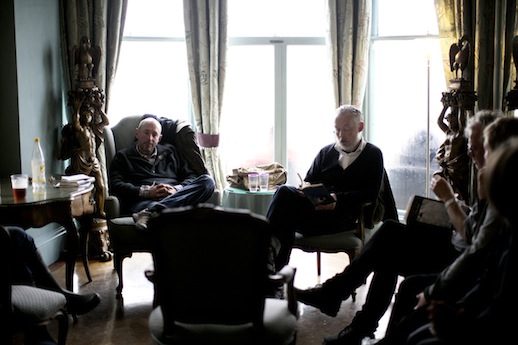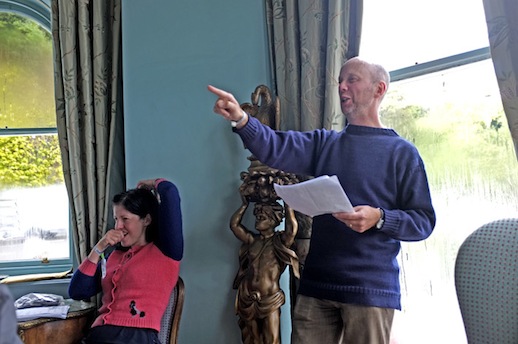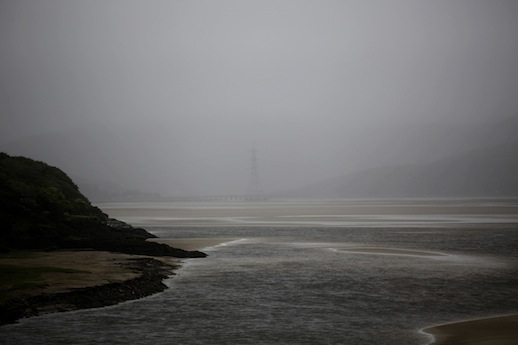 Pic: Tomo: The River Dwyryd, from the Portmeirion Hotel last Sunday morning.
Pic: Tomo: The River Dwyryd, from the Portmeirion Hotel last Sunday morning.
At 8am, this day, last week, I was seated in the dining room of a Porthmadog guest house with tea poured, newspaper open and toast on it’s way, feeling mightily pleased that I’d had the foresight to book myself off of the No 6 campsite for the last two nights of the festival. Outside, it was grey and wet and windy. The previous day’s predictions of ‘Armageddon Sunday’ were not yet true but the signs were there, the book was closed, all bets were off.
As the churches and chapels of Gwynedd were filling, the congregation at Portmeirion was thinning, the prayers from the punters asked not for forgiveness oh Father, but for smaller mercies – that their vehicles would not be stuck in a field of mud, that the shuttle buses were bigger, that the queue to get a seat on one shorter, that their mates had dry rolling papers. At 8.05 I received a text – ‘’we have to close your stage – production meeting asap. Can you bring me some Rizla”. A cab was called in haste, my Caught by the River colleagues, who had all been camping on site, were raised from their sleeping bags and pretty soon decisions would have to be made.
On site, it was grim. Our stage, right on the bank of the estuary, with trees hanging over the cliff above, was, unsurprisingly, off-limits. We couldn’t find alternative space for the musicians we had booked to play that evening – Wire, Charlie Boyer & The Voyeurs, Viv Albertine – so all we could do was to cancel them which was a real shame. Thankfully however we did manage to keep the rest of the programme going in a reading room of the Portmeirion Hotel, permission kindly given to us by a true believer in the beauty of words and water.
With us, to take the pictures you see on this page, were Neil ‘Tomo’ Thomson and Stephen ‘Spoonful’ Parker but sadly neither of them managed to get any shots of the fantastic Kane Players, a string octet led by Bernard Kane, who started proceedings with a selection of Bernard’s compositions, mostly on the theme of rivers, and especially the rivers of his birthplace, Wales. Stirring stuff that gave us the will to carry on. We look forward to having the Kane Players with us at Port Eliot next year.
Next up, the stalwarts, Charles Rangeley-Wilson and John Andrews. John began with a poem, written for Charles by Will Burns (who by then had hit the road), and based on a character in Charles’s book, Silt Road. As you may know, the subject of Silt Road is the Wye, the river which runs through the town of High Wycombe that enabled the growth of it’s furniture industry. Here’s the poem:
The Weird of Billy No-Toes (after Charles Rangeley-Wilson)
If there were things
cut off or somehow cropped,
the growth not stunted
but foreshortened with violence,
it could be toes, it could be
table legs.
It could be beech limbs
broken off and turned.
Or it could be breath
itself, here deep in the wood,
that is short.
A warning or a fraction
of what a man might carve
away from himself. Remake—
a chair perhaps, a new name.
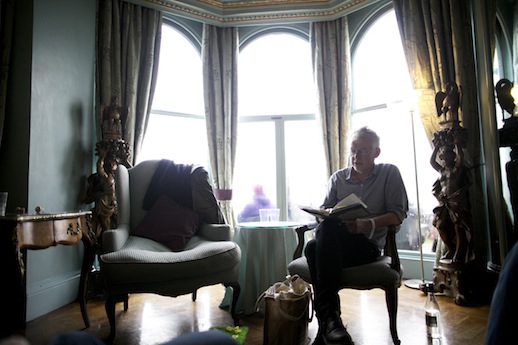 Pic: Tomo
Pic: Tomo
Tim Dee, reading from Four Fields, the Caught by the River Book of the Month for September
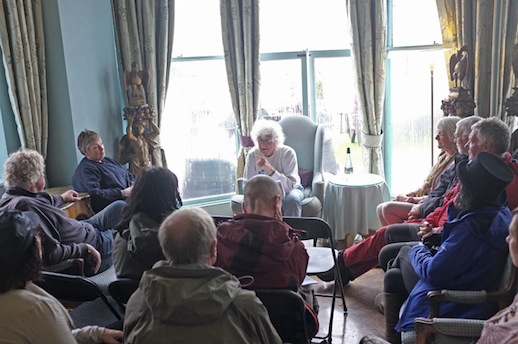 Pic: Parker
Pic: Parker
Jan Morris, talking fondly about her relationship with the village of Portmeirion and it’s architect / founder Sir Clough Williams-Ellis. This was good, very funny, irreverent at times, incredibly moving. Summed up best for me in this anecdote: At the end of his life, Clough was unwell and most concerned as to how he would be painted in his obituary in the Times. Jan couldn’t tell him that he had nothing to worry about, she’d already written it you see.
This is Roy Wilkinson conducting the first annual Caught by the River ‘Festival No. 6 pop-and-nature quiz’. It was hilarious but jeez, it was bloody hard. I’m not sure if anyone got full marks but I did hear that Mary Epworth was the winner receiving the grand prize of two tickets for next years festival. Congratulations to Mary, we’ll be seeing you there in 2014, cos you know what, even though Sunday started out on a downer, the way that everyone pulled together as they did, well, that made the last day of a fantastic festival even more special I reckon.
Mention must also go to Bob Stanley and Emma Warren who discussed The History of Pop and also to the irrepressible Richard Milward who treated us to a reading of his work. I’ll sign out now by saying thank you to everyone that appeared on our stage(s), to Lee and Becky, our buddies and co-curators at Faber Social who helped make the programme as strong and varied as it was, to all of you who came to have a listen or a dance, we hope you left smiling and to the organisers of the festival itself, thanks for having us. (JB)
